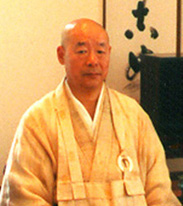
Stories of sexual abuse in Buddhist communities touch something raw in us, often rocking us to our core. For some, this leads to overwhelming feelings of betrayal, shock, and outrage; for others, the airing of criticism of one’s teacher evokes many of the same feelings, but now toward those who do the criticizing. Discussions quickly become difficult and divisive, and sanghas may well break apart as a result.
But much too often, these discussions never happen in the first place. Teachers and sanghas can sit on allegations for years, hoping that they will never see the light of day. As the victims of the abuse become pressured to keep things under wraps, the media—both Buddhist and mainstream—shy away from printing their stories, unable to publish accusations without a willing accuser.
This is what happened in the case of Eido Tai Shimano, for decades the abbot of the Zen Studies Society. But in 2010, an article printed by the NY Times reporting on the various allegations from female students that Eido had consensual and nonconsensual sexual relationships with them blew the lid of secrecy sky-high. The American Zen community already knew of Eido’s misconduct—details of his indiscretions going back almost 50 years, kept by Robert Aitken, had been distributed since 2008 (online since 2010), and stories of his misdeeds had been circulating for decades in private circles.
Despite all of this attention in the past, the intensity of focus on Eido Shimano and the Zen Studies Society has mostly dissipated by now. But the aftereffects of Eido Shimano’s conduct on the Zen Studies Society and of course, on the students that he abused, continue.
These effects have for the last month or so been the focus of coverage on Sweeping Zen, a Zen website run by Adam Tebbe. First came an interview with Shinge Sherry Chayat, who took over as Abbess of the Zen Studies Society after the retirement of Eido Shimano. An interview with Genjo Marinello, another dharma heir of Eido’s who has adopted a very critical stance towards his former teacher, followed. A guest blog post by Abbess Myoan Grace Schireson on how a Zen center can best “remediate and restructure in the aftermath of a teacher’s misconduct,” a post by Tebbe himself, and an interview with Kobutsu Shindo Kevin Malone rounded out the discussion.
Tebbe isn’t new to the Eido Shimano controversy—he’s been blogging about it since 2010, publishing Eido Shimano’s letter of resignation, his letter to the NY Times, and many open letters of Zen teachers who urged that Eido Shimano be fully terminated from the Zen Studies Society.
We applaud Tebbe for promoting transparency and for covering these issues bravely and thoroughly. As difficult as it may be to talk about topics like sexual abuse openly, effectively, and with compassion, to do so is undeniably important—as James Shaheen, Tricycle’s editor and publisher wrote on our blog in February 2011, “If we are able, as a broad community, to be forthright, honest, and self-critical in dealing with controversy, we are demonstrating something that is, in any religion, a virtue to be prized.”
We thank Adam for participating in the Q & A below. As always, we invite your comments and thoughts.

How did this series come about? Was there a reason why you decided to refocus on Eido Shimano and Zen Studies Society at this time? By chance, really. The latest interview with Kobutsu was simply one I have been trying to do for a while now. His interview took place before my conversation with Shinge Roko Chayat. I had asked him previously whether or not he would like to participate in an interview but I think he just wanted to feel me out some, to figure out who I am and what the website is about. The interview with Genjo Marinello and Myoan Grace Schireson’s article were more like reaction pieces to the interview with Shinge.
To be candid, I was as surprised as anyone to learn of what Genjo had to say in his interview. I knew that there had to be a reason behind his resignation from Zen Studies Society, but I was not aware of many of the things he brought to light in that interview. The whole thing is just sad. So, no it was not planned; which is interesting to me, even, considering the way it all unfolded.
I’m willing to focus on these issues at any time. It wasn’t a refocusing on the issue so much, because I don’t think we’ve seen the end of any of this. The story continues on and it’s only people’s attention spans that move along from it.
Are there other aspects of this issue that you would like to see get more attention? Are you planning on further coverage? As I understand it, the Zen Studies Society “story” has a lot more to it than we are privy to in the public. Not everyone believes that these issues are appropriate for public consumption; they say that it is in-house fighting that should remain behind closed doors. But these are public institutions we’re talking about.
So, do I plan further coverage? No, I don’t plan it.
I am committed to providing a platform, however, to those who wish to inform us all about new developments.
Are there any other issues in Zen America that are comparably pressing and that you would like to see similarly addressed? Without a doubt there are. There are others, but they are the stuff of rumors, you know? You’ll hear stuff off the record sometimes about certain teachers. I get e-mails from time to time from different people who wish to expose something. But that’s a dicey situation because if I run something, I have to be absolutely sure that it is accurate. I don’t believe in publishing rumors and I don’t think it is good journalism to do so.
You know, there seem to be some within the American Zen community who feel that it is the coverage of these events, those like we see with Shimano and Genpo, that are reflecting poorly upon the tradition. “Enough is enough, enough press has been made, let’s just move along.” I see it, of course, much differently. I think that so long as these people continue to actively seek leadership roles, without having to really atone for any of their missteps—then I think it’s wholly inappropriate to move on. It’s inappropriate and it’s irresponsible. Were we to do that, moving on would just mean we remain willfully ignorant.
The Zen tradition, as far as I’m concerned, is unassailable. The teachings, the practice—these speak for themselves. We all understand that human beings sometimes screw things up, and some more so than others. To my mind, if someone really is concerned about preserving tradition, then they will not act to suppress or hide information. To me, that is what harms and undermines the tradition, not airing so-called dirty laundry in public.
What has it been like for you, having Sweeping Zen become a kind of go-to source for discussion of this topic? Would you like to see it become a forum for further discussion on topics like this one? I’ll just say that I think the reason why this website works is because we’re not out to get anyone. My vision has and always will be that of maintaining a place where we look at the whole spectrum of things, not just those things that make us feel safe and warm but also those things which make us uncomfortable and that we find challenging to work through. I call that life.
I am glad that we offer a forum through which all kinds of conversations can take place. For the casual reader, these things are really interesting to read, just on the curiosity level. I find it so refreshing to see organizations and individuals standing up and speaking out, and not because we’re puritanical, sexually repressed prudes. That whole line about Zen showing us that there is no good or bad is a bunch of malarkey really. That’s the line people have depended on to carry out abuses and it has to stop. I believe we also have to stop making cultural excuses for these behaviors. We have to stop making excuses period. It’s weak language. It’s a way to sidestep the real issue—abuse, outright abuse.
It’s moral relativism. It’s nihilism.
It isn’t Buddhism and it isn’t Zen. As far as I’m concerned, Zen is brutal honesty. I think transparency is honesty’s best friend. If there truly were no good or bad, there would be no need for bodhisattvas. There would be no precepts.
I’m glad Sweeping Zen can play a role in offering a forum for these issues to be discussed. Zen is a beautiful tradition and we have a plethora of great teachers here in the West, senior practitioners who through their life experience and practice can help others navigate this whole thing. My hope is that I give a balanced view—an honest view. I only worry that my own striving for balance may actually allow for less balance in that, as a publisher, you sometimes think what it is your audience can handle. How far can you push the envelope? I hope that I’ll push things as far as they merit going—not an inch further and not an inch shorter.
Thank you for subscribing to Tricycle! As a nonprofit, we depend on readers like you to keep Buddhist teachings and practices widely available.